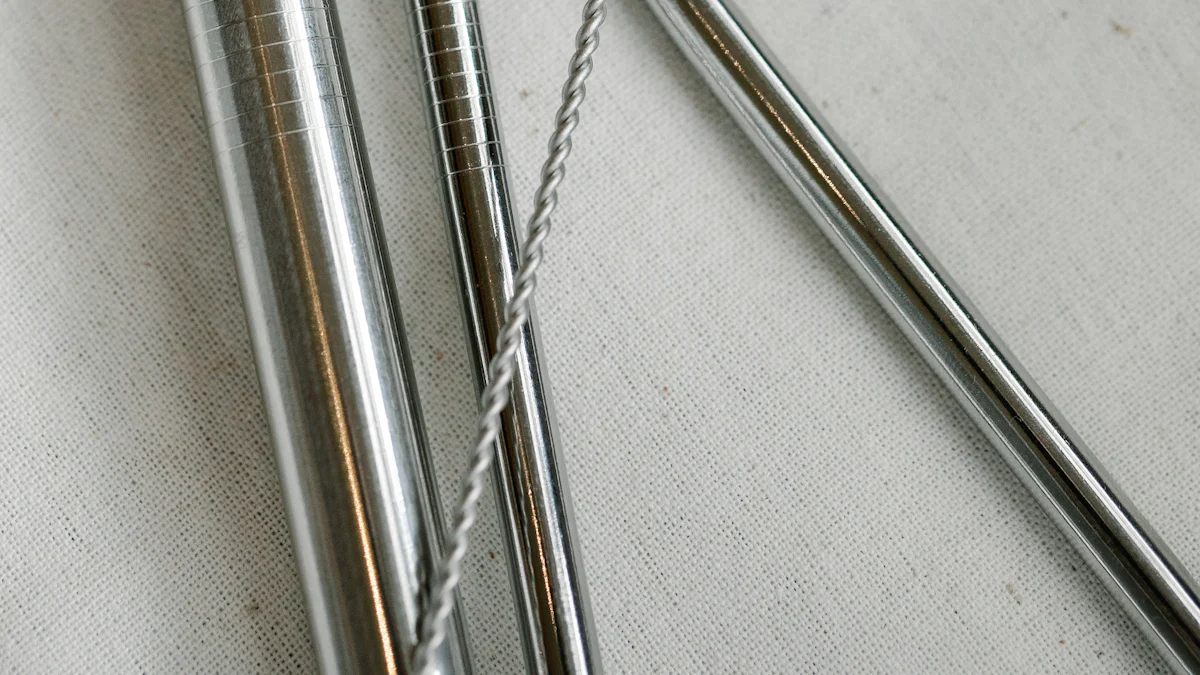
When choosing between titanium fasteners and stainless steel fasteners, you must consider their unique properties. Titanium fasteners offer exceptional strength-to-weight ratios, making them ideal for applications where reducing weight is critical. Stainless steel fasteners, on the other hand, provide durability and affordability, which suit everyday use. Corrosion resistance also varies significantly between the two materials. Your decision depends on factors like the environment, performance needs, and budget. Understanding these differences ensures you select the right material for your specific application.

When it comes to strength, titanium fasteners stand out due to their impressive strength-to-weight ratio. They provide high tensile strength while remaining lightweight, making them ideal for demanding applications. You will find that titanium fasteners perform exceptionally well in environments requiring both durability and reduced weight. Stainless steel fasteners, on the other hand, offer robust strength but are heavier. They are reliable for general use and can handle significant loads. However, if you need fasteners for aerospace or high-performance industries, titanium fasteners are often the better choice.
Weight plays a crucial role in many applications, especially in industries like aviation and automotive. Titanium fasteners weigh significantly less than stainless steel fasteners. This lower density makes titanium a preferred material when reducing overall weight is essential. For example, in aerospace engineering, every ounce matters, and titanium fasteners help achieve weight reduction without compromising strength. Stainless steel fasteners, while heavier, are still widely used because of their affordability and availability. If weight is not a primary concern, stainless steel fasteners may meet your needs effectively.
Corrosion resistance is another critical factor to consider. Titanium fasteners excel in harsh environments, such as marine or chemical settings, due to their superior resistance to rust and corrosion. They maintain their integrity even when exposed to saltwater or extreme weather conditions. Stainless steel fasteners also resist corrosion but are more prone to tarnishing or rusting over time, especially in environments with high salinity. If you need fasteners for outdoor or marine applications, titanium fasteners are the more reliable option. For indoor or less corrosive environments, stainless steel fasteners can still perform well.
When comparing the initial cost, titanium fasteners tend to be more expensive than stainless steel fasteners. The production process for titanium involves advanced techniques, which increases its price. Additionally, titanium’s unique properties, such as its high strength-to-weight ratio and superior corrosion resistance, contribute to its higher cost. Stainless steel fasteners, on the other hand, are more affordable and widely used in everyday applications. If you are working on a project with a tight budget, stainless steel fasteners may be the more practical choice. However, for specialized applications where performance outweighs cost, titanium fasteners might justify the investment.
While titanium fasteners have a higher upfront cost, they often provide better long-term value. Their exceptional durability and resistance to corrosion reduce the need for frequent replacements or maintenance. For example, in marine or chemical environments, titanium fasteners maintain their integrity over time, saving you money in the long run. Stainless steel fasteners, though durable, may require more upkeep in harsh conditions. Over time, factors like rust or tarnishing can lead to additional expenses. If you prioritize longevity and reduced maintenance, titanium fasteners offer a cost-effective solution despite their initial price.
The availability of titanium fasteners and stainless steel fasteners varies depending on your location and industry. Stainless steel fasteners are more readily available due to their widespread use in construction, automotive, and household applications. You can find them in most hardware stores or online marketplaces. Titanium fasteners, however, are less common and often require sourcing from specialized suppliers. Their limited availability can sometimes lead to longer lead times or higher shipping costs. If your project requires fasteners immediately, stainless steel options may be easier to obtain. For niche applications, planning ahead ensures you have access to titanium fasteners when needed.

Titanium fasteners excel in industries where weight reduction and corrosion resistance are critical. You will find them widely used in aerospace applications, where every ounce matters. Aircraft manufacturers rely on titanium fasteners to reduce overall weight while maintaining structural integrity. In the medical field, titanium fasteners play a vital role due to their biocompatibility and resistance to bodily fluids. They are also common in marine environments, as they withstand saltwater corrosion better than most materials. If your project involves extreme conditions or requires lightweight components, titanium fasteners are an excellent choice.
Stainless steel fasteners are ideal for general-purpose applications. You will often see them in construction, automotive, and household projects. Their durability and affordability make them a go-to option for tasks that demand strength without breaking the budget. Stainless steel fasteners perform well in indoor environments and moderate outdoor conditions. They are also popular in food processing equipment because of their hygienic properties. If you need reliable fasteners for everyday use or projects with less exposure to harsh elements, stainless steel fasteners are a practical solution.
Both titanium fasteners and stainless steel fasteners serve overlapping purposes in some cases. For example, both materials are suitable for automotive applications, depending on the specific requirements. You might choose titanium fasteners for high-performance vehicles where weight reduction is essential. Stainless steel fasteners, however, work well in standard vehicles where cost efficiency is a priority. In outdoor furniture or architectural projects, both materials can provide durability and aesthetic appeal. Understanding the unique strengths of each material helps you decide which one fits your needs best.
When strength and durability are your top priorities, you need to evaluate the demands of your project. Titanium fasteners provide exceptional tensile strength while maintaining a lightweight profile. They perform well in high-stress environments, such as aerospace or military applications, where both strength and longevity are critical. If your project involves exposure to extreme forces or vibrations, titanium fasteners offer a reliable solution.
Stainless steel fasteners, on the other hand, deliver robust strength suitable for general-purpose use. They handle significant loads and resist wear effectively in everyday applications. For construction or automotive projects, stainless steel fasteners often meet durability requirements without exceeding your budget. Consider the specific stress levels and environmental conditions your fasteners will face to make the right choice.
Weight plays a crucial role in industries like aviation, automotive, and sports equipment. Titanium fasteners weigh significantly less than stainless steel fasteners, making them ideal for applications where reducing weight is essential. For example, in aerospace engineering, lighter components improve fuel efficiency and overall performance. If portability or weight reduction is a priority, titanium fasteners provide a clear advantage.
Stainless steel fasteners, while heavier, remain a practical option for projects where weight is less critical. They are commonly used in construction, furniture, and household applications, where their added weight does not impact functionality. Evaluate whether weight reduction aligns with your project goals before deciding between titanium fasteners and stainless steel fasteners.
Balancing cost and performance is often the deciding factor when choosing fasteners. Titanium fasteners come with a higher initial cost due to their advanced manufacturing process and unique properties. However, their long-term value often outweighs the upfront expense. Their resistance to corrosion and wear reduces maintenance and replacement costs over time, especially in harsh environments.
Stainless steel fasteners are more affordable and widely available, making them a cost-effective choice for many projects. They provide reliable performance in moderate conditions without straining your budget. If your project does not require the specialized benefits of titanium fasteners, stainless steel fasteners offer a practical and economical solution. Assess your budget and performance needs to determine which material aligns best with your priorities.
Environmental conditions play a significant role in determining the right fastener material for your project. You must evaluate how factors like temperature, humidity, and exposure to chemicals or saltwater will impact the performance of titanium and stainless steel fasteners.
Titanium fasteners excel in extreme environments. They resist corrosion even when exposed to saltwater, making them ideal for marine applications. Their ability to withstand high temperatures also makes them suitable for aerospace and industrial settings. If your project involves harsh weather, chemical exposure, or prolonged contact with moisture, titanium fasteners provide unmatched reliability.
Stainless steel fasteners perform well in moderate environmental conditions. They resist rust and corrosion in indoor or less aggressive outdoor settings. However, they may tarnish or degrade over time in highly corrosive environments, such as coastal areas or chemical plants. For projects in controlled environments, stainless steel fasteners offer a durable and cost-effective solution.
When choosing between these materials, consider the specific environmental challenges your fasteners will face. Titanium fasteners are better suited for demanding conditions, while stainless steel fasteners work well in standard applications. By aligning your choice with the environment, you ensure long-lasting performance and reduced maintenance needs.
Titanium fasteners and stainless steel fasteners offer unique benefits that cater to different needs. Titanium works best for projects requiring lightweight materials, high performance, and excellent corrosion resistance. Stainless steel provides a cost-effective solution with durability and widespread availability. Your choice should align with your specific priorities, such as budget, environmental conditions, and performance requirements. By understanding the strengths of each material, you can confidently select the option that delivers the best results for your application.